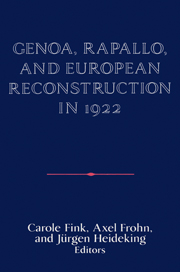Book contents
- Frontmatter
- Introduction
- 1 Beyond Revisionism: The Genoa Conference of 1922
- 2 The Genoa Conference of 1922: Lloyd George and the Politics of Recognition
- 3 A Rainy Day, April 16, 1922: The Rapallo Treaty and the Cloudy Perspective for German Foreign Policy
- 4 Reparations in 1922
- 5 Germany and the United States: The Concept of World Economic Interdependence
- 6 American Policy Toward Debts and Reconstruction at Genoa, 1922
- 7 French Plans for the Reconstruction of Russia: A History and Evaluation
- 8 The Oil Problem and Soviet-American Relations at the Genoa Conference of 1922
- 9 Italy at the Genoa Conference: Italian-Soviet Commercial Relations
- 10 The European Policy of Czechoslovakia on the Eve of the Genoa Conference of 1922
- 11 The Genoa Conference and the Little Entente
- 12 The Role of Switzerland and the Neutral States at the Genoa Conference
- 13 The Genoa Conference and Japan: A Lesson in Great-Power Diplomacy
- Maps
- Appendix
- Bibliography
- Contributors
- Index
5 - Germany and the United States: The Concept of World Economic Interdependence
Published online by Cambridge University Press: 05 January 2013
- Frontmatter
- Introduction
- 1 Beyond Revisionism: The Genoa Conference of 1922
- 2 The Genoa Conference of 1922: Lloyd George and the Politics of Recognition
- 3 A Rainy Day, April 16, 1922: The Rapallo Treaty and the Cloudy Perspective for German Foreign Policy
- 4 Reparations in 1922
- 5 Germany and the United States: The Concept of World Economic Interdependence
- 6 American Policy Toward Debts and Reconstruction at Genoa, 1922
- 7 French Plans for the Reconstruction of Russia: A History and Evaluation
- 8 The Oil Problem and Soviet-American Relations at the Genoa Conference of 1922
- 9 Italy at the Genoa Conference: Italian-Soviet Commercial Relations
- 10 The European Policy of Czechoslovakia on the Eve of the Genoa Conference of 1922
- 11 The Genoa Conference and the Little Entente
- 12 The Role of Switzerland and the Neutral States at the Genoa Conference
- 13 The Genoa Conference and Japan: A Lesson in Great-Power Diplomacy
- Maps
- Appendix
- Bibliography
- Contributors
- Index
Summary
The foreign policy of the Weimar Republic was to a large extent preoccupied with the problem of reparations, a controversial issue for contemporaries as well as for later historians. What the Allies considered just compensation for damages and losses caused by German aggression, the Germans viewed as tribute imposed by relentless victors, which was designed to weaken their country permanently. Moreover, reparations involved more than money. In many ways, the issue raised the crucial question of enforcement or revision of the Treaty of Versailles. If the Germans successfully denounced Allied claims as unjust and absurd, they could hope to shatter the treaty as a whole. And if the Allies allowed Germany to default on reparations, who could guarantee that the Reich would still observe the treaty's other stipulations? The underlying challenge of who had won and who had lost World War I accounts for much of the intransigence on both sides.
Historians and economists have fought over reparations almost as fiercely as did the politicians of the 1920s. After World War II, reparations were generally blamed for the ruin of the Weimar Republic; but more recently, scholars have asserted that Germany's reparations policies, with only a few tactical modifications, actually consisted of continuous and successful obstruction. To be sure, it is not surprising that neither the German people nor their governments ever accepted reparation payments as a moral obligation.
- Type
- Chapter
- Information
- Genoa, Rapallo, and European Reconstruction in 1922 , pp. 77 - 94Publisher: Cambridge University PressPrint publication year: 1991
- 2
- Cited by

